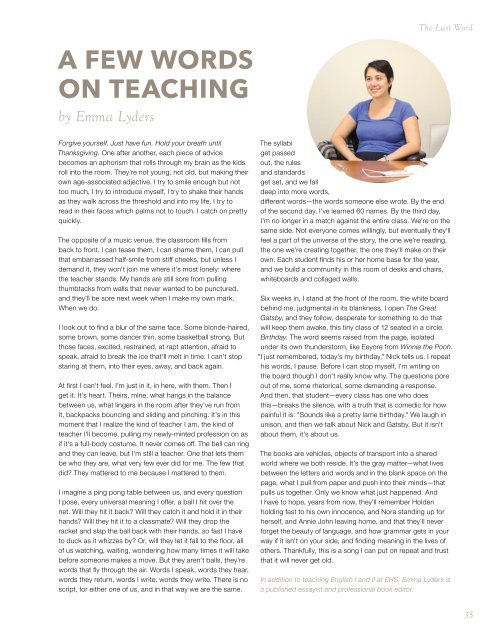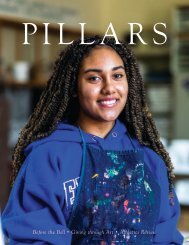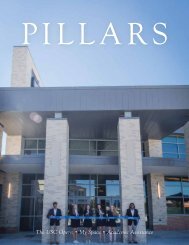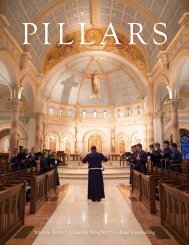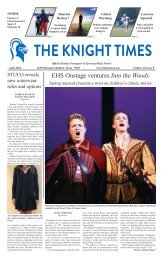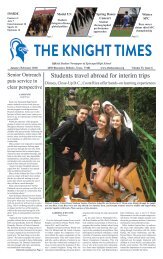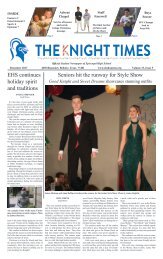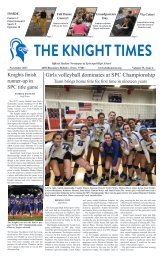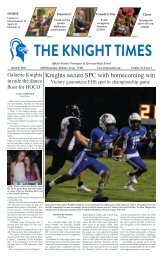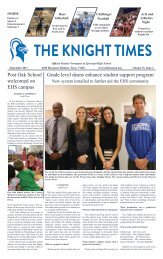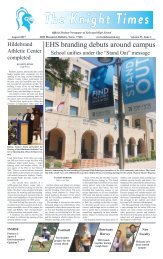EHS Pillars - Fall 2016
PILLARS - The Episcopal High School Magazine www.ehshouston.org
PILLARS - The Episcopal High School Magazine www.ehshouston.org
Create successful ePaper yourself
Turn your PDF publications into a flip-book with our unique Google optimized e-Paper software.
A FEW WORDS<br />
ON TEACHING<br />
by Emma Lyders<br />
Forgive yourself. Just have fun. Hold your breath until<br />
Thanksgiving. One after another, each piece of advice<br />
becomes an aphorism that rolls through my brain as the kids<br />
roll into the room. They're not young, not old, but making their<br />
own age‐associated adjective. I try to smile enough but not<br />
too much, I try to introduce myself, I try to shake their hands<br />
as they walk across the threshold and into my life, I try to<br />
read in their faces which palms not to touch. I catch on pretty<br />
quickly.<br />
The opposite of a music venue, the classroom fills from<br />
back to front. I can tease them, I can shame them, I can pull<br />
that embarrassed half‐smile from stiff cheeks, but unless I<br />
demand it, they won't join me where it's most lonely: where<br />
the teacher stands. My hands are still sore from pulling<br />
thumbtacks from walls that never wanted to be punctured,<br />
and they'll be sore next week when I make my own mark.<br />
When we do.<br />
I look out to find a blur of the same face. Some blonde‐haired,<br />
some brown, some dancer thin, some basketball strong. But<br />
those faces, excited, restrained, at rapt attention, afraid to<br />
speak, afraid to break the ice that'll melt in time. I can't stop<br />
staring at them, into their eyes, away, and back again.<br />
At first I can't feel. I'm just in it, in here, with them. Then I<br />
get it. It's heart. Theirs, mine, what hangs in the balance<br />
between us, what lingers in the room after they've run from<br />
it, backpacks bouncing and sliding and pinching. It's in this<br />
moment that I realize the kind of teacher I am, the kind of<br />
teacher I'll become, pulling my newly‐minted profession on as<br />
if it's a full‐body costume. It never comes off. The bell can ring<br />
and they can leave, but I'm still a teacher. One that lets them<br />
be who they are, what very few ever did for me. The few that<br />
did? They mattered to me because I mattered to them.<br />
I imagine a ping pong table between us, and every question<br />
I pose, every universal meaning I offer, a ball I hit over the<br />
net. Will they hit it back? Will they catch it and hold it in their<br />
hands? Will they hit it to a classmate? Will they drop the<br />
racket and slap the ball back with their hands, so fast I have<br />
to duck as it whizzes by? Or, will they let it fall to the floor, all<br />
of us watching, waiting, wondering how many times it will take<br />
before someone makes a move. But they aren't balls, they're<br />
words that fly through the air. Words I speak, words they hear,<br />
words they return, words I write, words they write. There is no<br />
script, for either one of us, and in that way we are the same.<br />
The Last Word<br />
The syllabi<br />
get passed<br />
out, the rules<br />
and standards<br />
get set, and we fall<br />
deep into more words,<br />
different words—the words someone else wrote. By the end<br />
of the second day, I've learned 60 names. By the third day,<br />
I'm no longer in a match against the entire class. We're on the<br />
same side. Not everyone comes willingly, but eventually they'll<br />
feel a part of the universe of the story, the one we're reading,<br />
the one we're creating together, the one they'll make on their<br />
own. Each student finds his or her home base for the year,<br />
and we build a community in this room of desks and chairs,<br />
whiteboards and collaged walls.<br />
Six weeks in, I stand at the front of the room, the white board<br />
behind me, judgmental in its blankness. I open The Great<br />
Gatsby, and they follow, desperate for something to do that<br />
will keep them awake, this tiny class of 12 seated in a circle.<br />
Birthday. The word seems raised from the page, isolated<br />
under its own thunderstorm, like Eeyore from Winnie the Pooh.<br />
"I just remembered, today's my birthday," Nick tells us. I repeat<br />
his words, I pause. Before I can stop myself, I'm writing on<br />
the board though I don't really know why. The questions pore<br />
out of me, some rhetorical, some demanding a response.<br />
And then, that student—every class has one who does<br />
this—breaks the silence, with a truth that is comedic for how<br />
painful it is: "Sounds like a pretty lame birthday." We laugh in<br />
unison, and then we talk about Nick and Gatsby. But it isn't<br />
about them, it's about us.<br />
The books are vehicles, objects of transport into a shared<br />
world where we both reside. It's the gray matter—what lives<br />
between the letters and words and in the blank space on the<br />
page, what I pull from paper and push into their minds—that<br />
pulls us together. Only we know what just happened. And<br />
I have to hope, years from now, they'll remember Holden<br />
holding fast to his own innocence, and Nora standing up for<br />
herself, and Annie John leaving home, and that they'll never<br />
forget the beauty of language, and how grammar gets in your<br />
way if it isn't on your side, and finding meaning in the lives of<br />
others. Thankfully, this is a song I can put on repeat and trust<br />
that it will never get old.<br />
In addition to teaching English I and II at <strong>EHS</strong>, Emma Lyders is<br />
a published essayist and professional book editor.<br />
35


